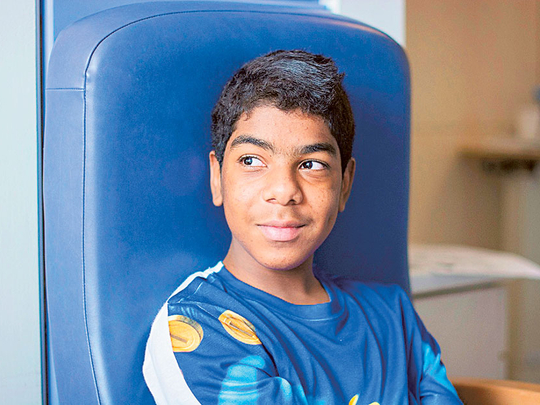
Dubai: Conducting a technique that has not been carried out on children, a nephrologist from the Great Ormond Street Hospital (GOSH) saved the life of a Dubai boy, Eisa Lashkari.
The 14-year-old has had congenital anomalies as he was born with only one kidney which had not formed properly. At the age of five Eisa underwent his first transplant after failure of the existing kidney in the Philippines.
However, eight years later, the boy’s kidney functions continued to decline and he required kidney replacement therapy with haemodialysis, which he had never had previously. After a recommendation from the local health office in Dubai, the Lashkari family agreed to take Eisa for treatment to GOSH.
Eisa spent a year being treated at GOSH and seven months on dialysis before he was able to have a second transplant under the care of his consultant Dr Stephen Marks, consultant paediatric nephrologist at the hospital.
Dr Marks and his team decided that Eisa needed another kidney transplant, and Eisa’s mother was proposed as a donor. Unfortunately, Eisa had a high level of Human Leukocyte Antigen (HLA) antibodies, meaning that the likelihood of his body rejecting the new kidney was very high.
“Eisa required antibody removal so that he was able to receive his mother’s kidney. This was the first HLA incompatible kidney transplant in a child performed in the UK.” said Dr Marks. Collaborating with transplant surgeons at Guy’s Hospital in London and Kings College London, Eisa underwent his kidney transplant with antibody removal, whereby his HLA antibodies were removed before transplant using a blood filtering process known as plasmapheresis. This meant that Eisa could receive his mother’s kidney without his body rejecting it.
Dr Marks added: “This is the first time that an HLA incompatible kidney transplant has been performed in the UK on a child. Historically, children with HLA antibodies would not be able to receive kidneys from living donors and would be on the waiting list for deceased donor kidney transplants for many years.”
Eisa who has recovered completely has since come back home. His delighted father, Ahmad, said: “Since the operation, Eisa has been absolutely fine. He has been out and about with friends. He has a normal life.”.
The procedure was life-saving for Eisa and an important moment in the future treatment of children needing kidney transplants.












